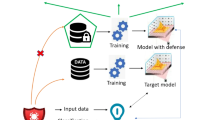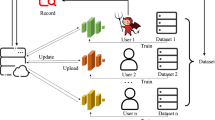Abstract
The development of deep learning has brought about the business model of Machine Learning as a Service (MLaaS). Malicious users can infer whether a member has participated in model training through Membership Inference Attacks (MIA), thereby stealing user privacy. Although various methods have been proposed to defend against membership inference attacks, they are all aimed at defending against a certain type of membership inference attack and cannot defend against various membership inference attacks at the same time. This paper proposes the MEWDP method, which can defend against multiple types of membership inference attacks. Firstly, it uses multi-round MIXUP data augmentation method to process privacy data and adds non-interference noise to the data in the form of data fusion. Then, during the model training stage, Gaussian noise that satisfies differential privacy is added to protect model privacy, and label smoothing method is used to prevent the training model from overfitting. The results show that this defense method can reduce the success rate of metric-based membership inference attacks to 51.2%, and reduce the success rate of model-based membership inference attacks to 50.9%. Compared with other defense methods, the MEWDP defense method has universality and better defense effect. For the CIFAR10 dataset, it can reduce the success rate of member attacks to 50.8%.
Access this chapter
Tax calculation will be finalised at checkout
Purchases are for personal use only
Similar content being viewed by others
References
Brown, T., Mann, B., Ryder, N., et al.: Language models are few-shot learners. Adv. Neural. Inf. Process. Syst. 33, 1877–1901 (2020)
Tramèr, F., Zhang, F., Juels, A., et al.: Stealing machine learning models via prediction {APIs}. In: 25th USENIX Security Symposium (USENIX Security 2016), pp. 601–618 (2016)
Shen, S., Tople, S., Saxena, P.: Auror: defending against poisoning attacks in collaborative deep learning systems. In: Proceedings of the 32nd Annual Conference on Computer Security Applications, pp. 508–519 (2016)
Barreno, M., Nelson, B., Sears, R., et al.: Can machine learning be secure? Proceedings of the 2006 ACM Symposium on Information, Computer and Communications Security, pp. 16–25 (2006)
Gu, T., Dolan-Gavitt, B., Garg, S.: BadNets: Identifying Vulnerabilities in the Machine Learning Model Supply Chain (2017). arXiv preprint arXiv:1708.06733
Shokri, R., Stronati, M., Song, C., et al.: Membership inference attacks against machine learning models. In: 2017 IEEE Symposium on Security and Privacy (SP), pp. 3–18. IEEE (2017)
Zhao, L., Wang, Q., Wang, C., et al.: Veriml: enabling integrity assurances and fair payments for machine learning as a service. IEEE Trans. Parallel Distrib. Syst. 32(10), 2524–2540 (2021)
Li, Z., Zhang, Y.: Membership leakage in label-only exposures. In: Proceedings of the 2021 ACM SIGSAC Conference on Computer and Communications Security, pp. 880–895 (2021)
Hui, B., Yang, Y., Yuan, H., et al.: Practical blind membership inference attack via differential comparisons. arXiv preprint arXiv:2101.01341 (2021)
Park, Y., Kang, M.: Membership inference attacks against object detection models. arXiv preprint arXiv:2001.04011 (2020)
Song, L., Mittal, P.: Systematic evaluation of privacy risks of machine learning models. In: 30th USENIX Security Symposium (USENIX Security 2021), pp. 2615–2632 (2021)
Jia, J., Salem, A., Backes, M., et al.: Memguard: defending against black-box membership inference attacks via adversarial examples. In: Proceedings of the 2019 ACM SIGSAC Conference on Computer and Communications Security, pp. 259–274 (2019)
Nasr, M., Shokri, R., Houmansadr, A.: Machine learning with membership privacy using adversarial regularization. In: Proceedings of the 2018 ACM SIGSAC Conference on Computer and Communications Security, pp. 634–646 (2018)
Dwork, C.: Differential privacy: a survey of results. In: Agrawal, M., Du, D., Duan, Z., Li, A. (eds.) TAMC 2008. LNCS, vol. 4978, pp. 1–19. Springer, Heidelberg (2008). https://doi.org/10.1007/978-3-540-79228-4_1
Dwork, C., Roth, A.: The algorithmic foundations of differential privacy. Found. Trends® Theor. Comput. Sci. 9(3–4), 211–407 (2014)
Han, R., Li, D., Ouyang, J., et al.: Accurate differentially private deep learning on the edge. IEEE Trans. Parallel Distrib. Syst. 32(9), 2231–2247 (2021)
Owusu-Agyemeng, K., Qin, Z., Xiong, H., et al.: MSDP: multi-scheme privacy-preserving deep learning via differential privacy. Pers. Ubiquitous Comput. 1–13 (2021)
Rahman, M.A., Rahman, T., Laganière, R., et al.: Membership inference attack against differentially private deep learning model. Trans. Data Priv. 11(1), 61–79 (2018)
Hagestedt, I., Zhang, Y., Humbert, M., et al.: MBeacon: privacy-preserving beacons for DNA methylation data (2019)
Chen, J., Wang, W.H., Shi, X.: Differential privacy protection against membership inference attack on machine learning for genomic data. In: BIOCOMPUTING 2021: Proceedings of the Pacific Symposium, pp. 26–37 (2020)
Chen, Z., Li, H., Hao, M., Xu, G.: Enhanced mixup training: a defense method against membership inference attack. In: Deng, R., Bao, F., Wang, G., Shen, J., Ryan, M., Meng, W., Wang, D. (eds.) ISPEC 2021. LNCS, vol. 13107, pp. 32–45. Springer, Cham (2021). https://doi.org/10.1007/978-3-030-93206-0_3
Krizhevsky, A., Hinton, G.: Learning multiple layers of features from tiny images (2009)
Author information
Authors and Affiliations
Corresponding author
Editor information
Editors and Affiliations
Rights and permissions
Copyright information
© 2024 The Author(s), under exclusive license to Springer Nature Singapore Pte Ltd.
About this paper
Cite this paper
Cui, G., Ge, L., Zhao, Y., Fang, T. (2024). A Member Inference Attack Defense Method Based on Differential Privacy and Data Enhancement. In: Huang, DS., Premaratne, P., Yuan, C. (eds) Applied Intelligence. ICAI 2023. Communications in Computer and Information Science, vol 2015. Springer, Singapore. https://doi.org/10.1007/978-981-97-0827-7_23
Download citation
DOI: https://doi.org/10.1007/978-981-97-0827-7_23
Published:
Publisher Name: Springer, Singapore
Print ISBN: 978-981-97-0826-0
Online ISBN: 978-981-97-0827-7
eBook Packages: Computer ScienceComputer Science (R0)




